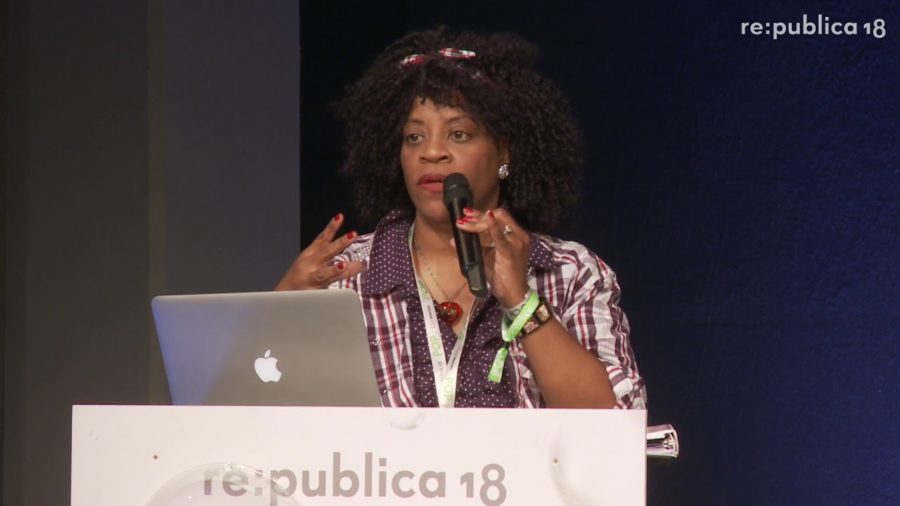Robin Wilson-Beattie: Hi. I’m Robin Wilson-Beattie, and I am a disability and sexuality educator based in San Francisco, California. I apologize for being late. Like, everything happened this morning.
What I do is I do disability and sexuality education. And activism and advocacy around sexuality and disability issues, and reproductive health issues. And I want to teach the world that people with disabilities have the right and ability to give and receive pleasure.
On Twitter, I am @sexAbled, and I tweet about national and global issues related to human sexuality, as well as how it intersects with disability and sexual orientation, race, gender, and culture.
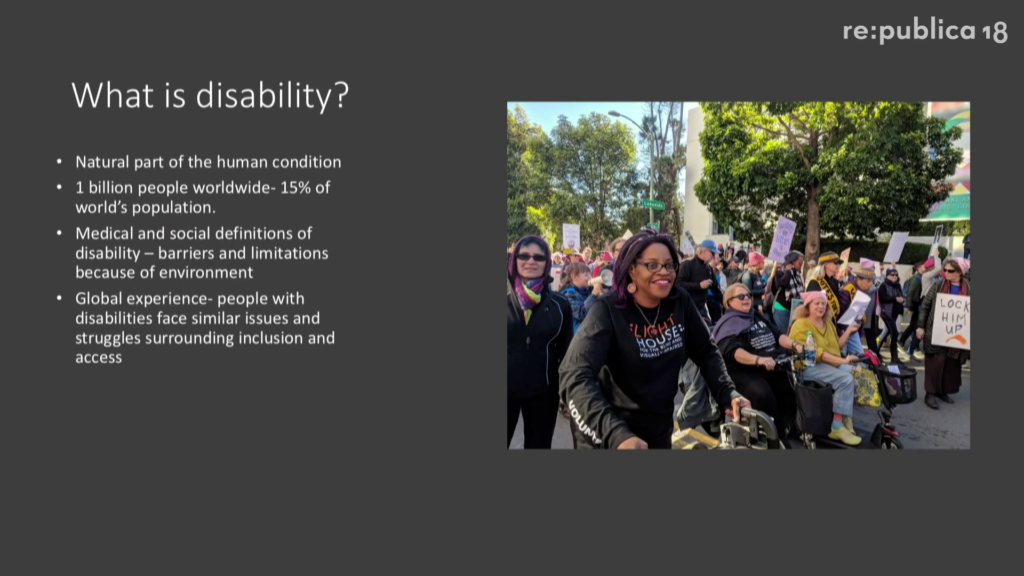
Now, disability is a natural part of the human condition. One billion people (which is you know, roughly about 15% of the world’s population), are people living with some form of disability. And to have a disability means that a person has a physical, or mental, or cognitive condition that impacts your ability to participate in society. This is a medical definition, but it’s due to biology. But it’s also a social definition, because we’re talking about the barriers that limit your participation in your communities. And I’m a person with both visible disabilities and hidden disabilities, so I am also one of that number. But regardless of where people in the world live, we face similar issues in our struggles surrounding inclusion and access.
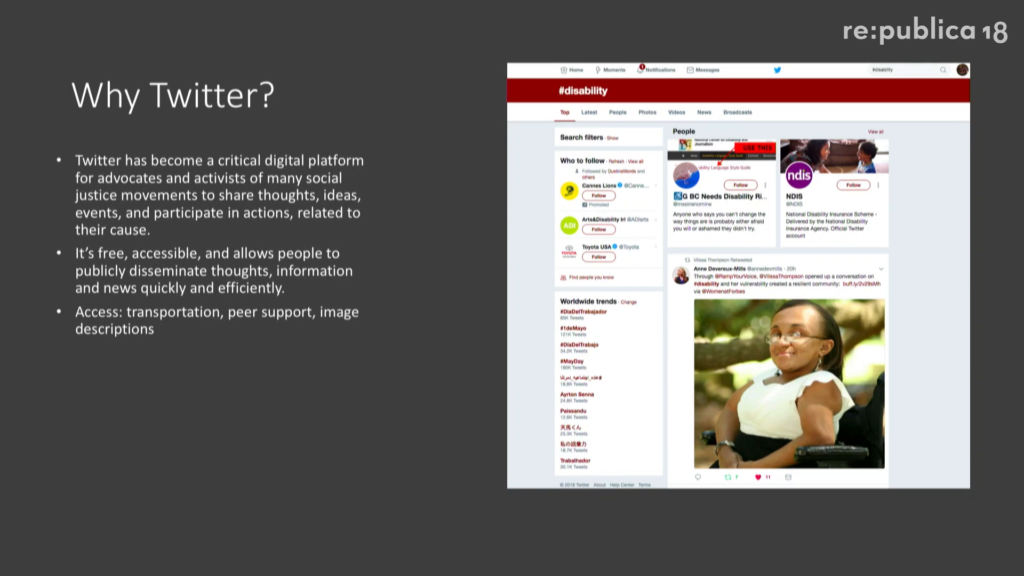
Okay. So why Twitter? Twitter has actually really become a critical digital platform for advocates and activists in many social justice movements to share thoughts and ideas, and events, and to participate in actions related to their cause. It’s free. It’s accessible. And it allows people to publicly disseminate their thoughts, information, and their news really quickly and really efficiently.
What makes Twitter particularly unique in the social media sphere is the very open and public way that people are able to connect around the world and have unparalleled access to organizations, businesses, public officials and figures. Like, you connect with people really quickly, really openly, in a way that you can’t connect sometimes with a phone call or writing a letter.
So why is Twitter an ideal platform, though, for disability advocates and activists who want to create change in their communities? And like I mentioned, first off it is free! And one barrier to access that people with disabilities face are economic. Across the world, people with disabilities have less economic participation and higher rates of poverty than people without disabilities, and this is partly because people with disabilities experience barriers in accessing services that many able-bodied people take for granted, including health, education, employment, and transportation. As well as information. And these difficulties are even more exacerbated in less-advantaged communities.
With Twitter, you don’t have to leave your house in order to connect, and organize, and educate. And as such, it’s accommodating for people with disabilities that can face acquiring transportation to meet up with other like-minded individuals. Like going to a meeting; that takes more than just takes effort, it takes energy, but also is the transport even there? But it also offers peer support in a way that is unique, because people can easily find and follow and interact with others who share and identify with your experience.
And Twitter also has some really cool features like as far as accessibility goes, they even offer a way to embed image descriptions into a photograph so that people with visual disabilities can know what’s going on, and what’s being depicted in a scene or a picture.
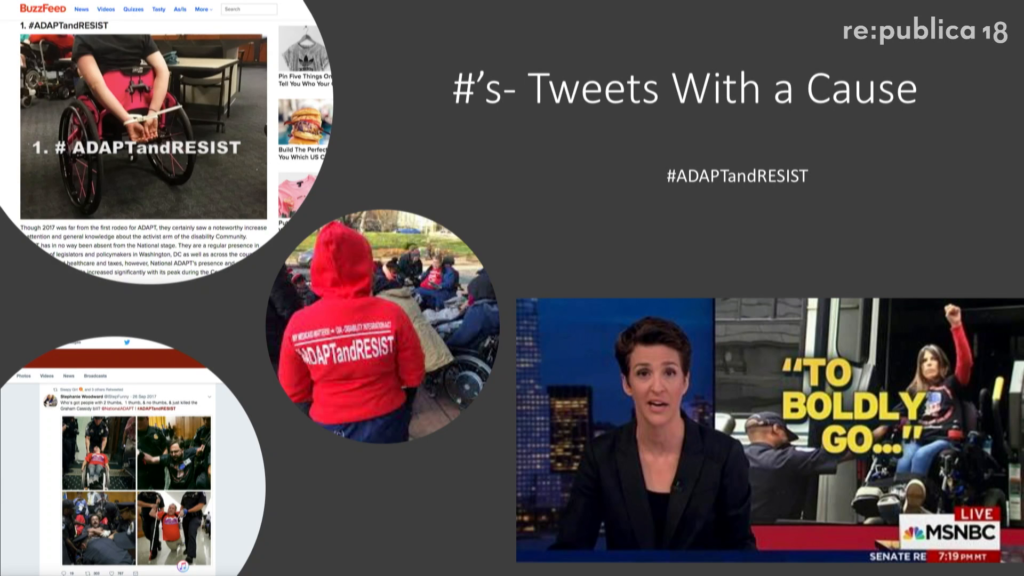
So how are people with disabilities using Twitter to start the revolution? Well, a prime example of how Twitter has been amazingly effective in getting out the word is at this hashtag #ADAPTandRESIST. And National ADAPT is a… It’s in the United States. And it’s a grassroots disability advocacy group. And they organize nonviolent civil disobedience actions and protest in order to protest injustice, and to protect the civil liberties of people with disabilities.
And in September 2017, there was impending legislation from the lovely Trump administration to repeal parts of this Affordable Care Act in America, that would make cuts to Medicaid. For people with disabilities, this could be life-threatening because Medicaid provides the healthcare for people disabilities. And also, in home medical care you can select your carers to help you, so you can stay out of living in institutions and nursing homes. Because that’s what they’ll do, put you in there. But having support allows you to live independently in the community and have that autonomy. And it also is cheaper but you know, they haven’t seen it like that.
So, with this tweet, what they did was they used this hashtag #ADAPTandRESIST, and as you can see they put it on the backs of their shirts. But they used this hashtag add to tweet their activities, the actions. And and they did live updates, using Twitter, of what was happening, what was going on, and garnering support in the forms of everybody sharing that information and it going out everywhere, and people are seeing these images. But also not so much about just sharing the information, but as well as fundraising. They were able to raise funds through this. But also to educate people about why the proposed cuts were dangerous. And as you can see, they had sit-ins at the Senate building to kill this bill that was introduced to cut Medicaid. And so people all over the world saw these images of people with disabilities being dragged out of their chairs and being handcuffed. (And it’s like, you can’t push your wheelchair if you’re in handcuffs.) But they use this very proud hashtag, #ADAPTandRESIST, and that was picked up all over the world from people tweeting this.
And as a result, at BuzzFeed, that was the number one hashtag for that. And the national news also picked up on it as a result of this action and everything. And here we have Rachel Maddow, a reporter for MSNBC, a national news station at home.
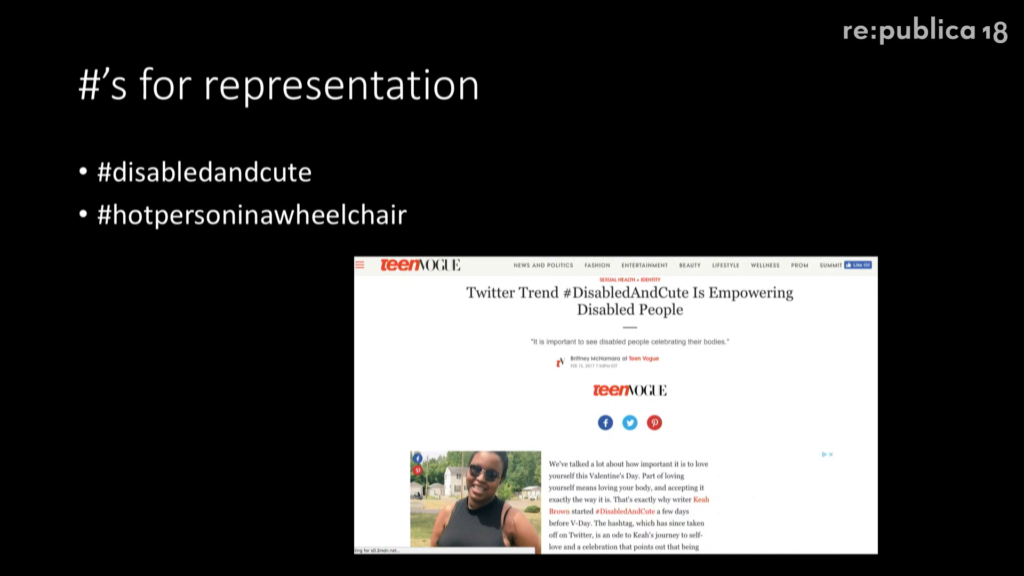
McNamara, Brittney. “This Social Media Movement Proves You Can Be Disabled and Cute.” Teen Vogue.
But hashtags are also used for representation and for empowerment as far as promoting inclusion. And recent hashtags such as #DisabledAndCute, which was started by Keah Brown right before Valentine’s Day to talk about self-love and empowerment and celebrating that as a person with a disability. And that was one Twitter trend. And you know, seeing yourself and seeing others that are like you, that’s very powerful. And people owning what it is that they have about themselves.
And another one that’s recently been trending has been #HotPersonInAWheelchair. It was in response to… It was a tweet that was a couple of years old, where this guy said there’s nothing more sad than seeing a hot person in a wheelchair. And people were like, “Yeah, you’re crying because you can’t get with this #HotPersonInAWheelchair.” So that was pretty cool.
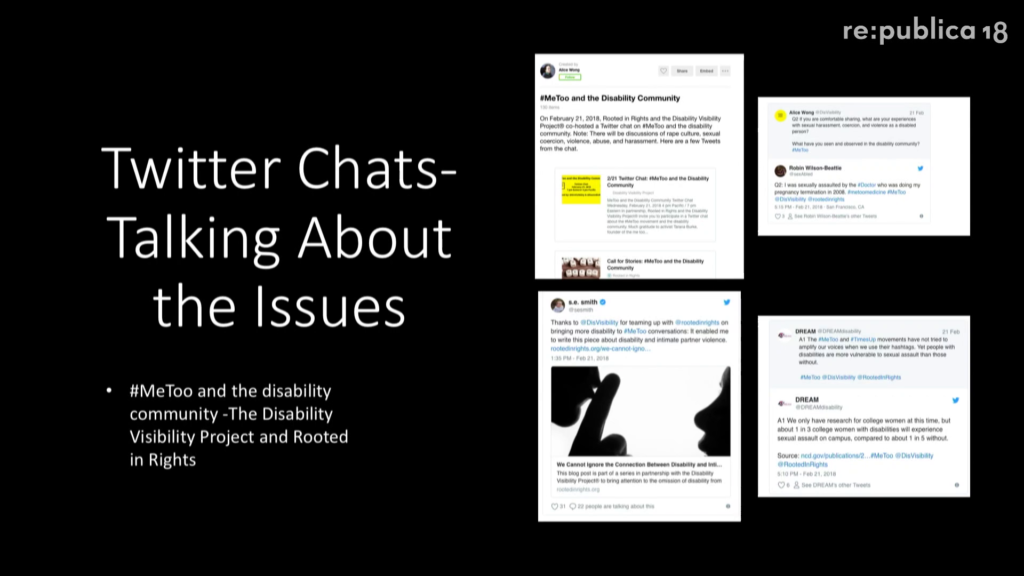
But, another form where people are using Twitter for advocacy, activism, and information is Twitter chats. You’ve heard of the #MeToo hashtag and people talking about sexual assault, sexual harassment in communities. But people with disabilities are like, “Hey. Wait a minute. We’re getting completely left out of the conversation,” because people with disabilities, on average we have a higher rate than able-bodied people of being sexually assaulted or hurt. And so this Twitter chat was a very important conversation that Alice Wong, who is the founder of the Disability Visibility Project, got together with another—and this is where groups are also getting together with other social justice groups. And they got together with Rooted in Rights and hosted a Twitter chat where people with disabilities were able to talk about their MeToo moments.
But not just talk about it, there were also things that were talked about— okay, what about self-defense? And people were like, “Well you know, most of the time self-defense is built up for people who are able-bodied.” Well, someone else was able to share across the country, “Hey. This person is doing self-defense classes for people with disabilities and making accommodations and figuring out different ways.” And so that was [something] unique that came out of that chat, and people were like, “Oh! Hey. I want to see if we can find somebody to start this in my community.”
Another thing that came out of this then was SE Smith is a writer and a founder of [Disabled] Writers, an organization for people that want to hire people with disabilities to write about issues. And they wrote an article about disability and intimate partner violence as a result of this chat.
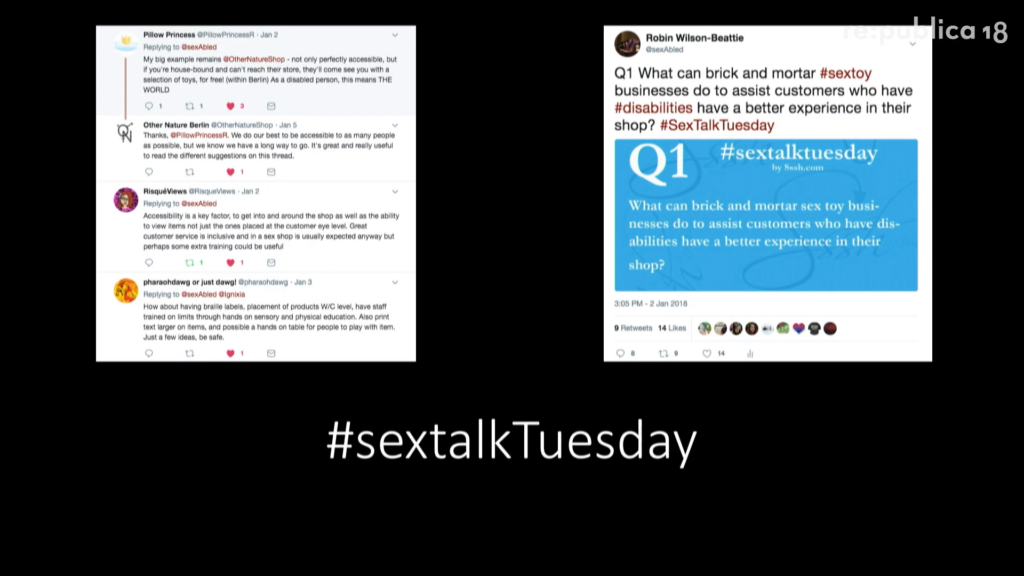
But Twitter chats can also be used for other things. In my work I used it to find out about sex toys and disability, and the kinds of things that people with disabilities, what they want from manufacturers of sex toys, suggestions, and also wanted to talk to retailers about things that they could do. And I did this Twitter chat earlier in the year in January. And there were people from all over the world that were on this chat.
And here was somebody from Berlin, as a matter of fact, who posted when we were talking about how can retail businesses assist customers with disabilities on having a better experience in their shop. This person and talked about Other Nature Shop in Berlin, and how not only the shop is perfectly accessible, but they’re like if you’re housebound you can’t reach their store they’ll come see you with a selection of toys, and it’s free within Berlin. And we were all like wow, that is amazing. What an idea! So that was that.
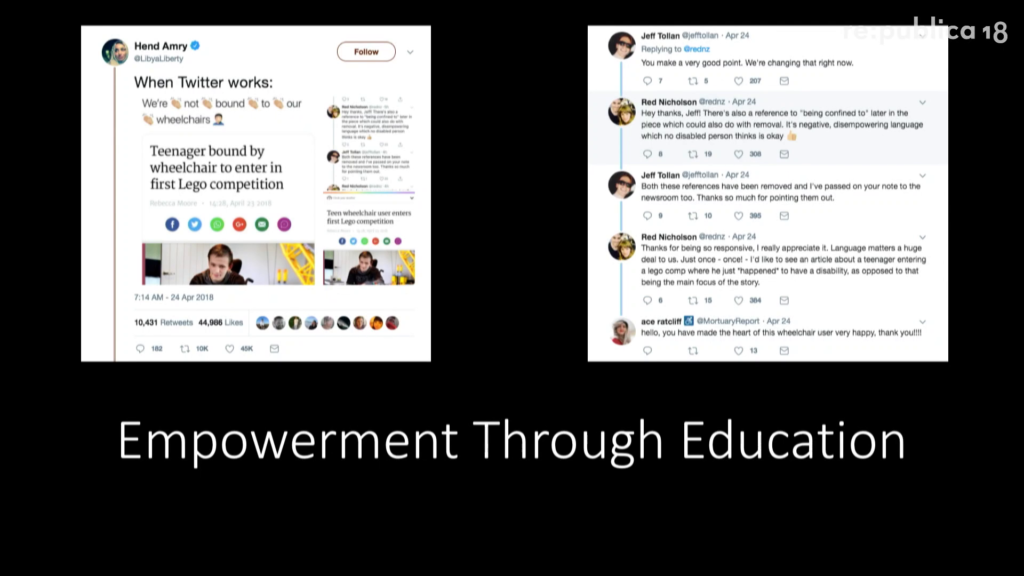
Tollan, Jeff. “You Make a Very Good Point. We’re Changing That Right Now.” Tweet. @jefftollan (Twitter), April 23, 2018.
But also, Twitter works for changing language and ideas and thoughts. Because oftentimes the media will use the phrase “wheelchair-bound.” It’s not…we’re not bound to it. It’s a mobility device. Actually it helps liberate you and allows you to enter the community. And this is where the reporter had wrote, “Teenager bound by wheelchair to enter in first Lego competition.” And this gentlemen wrote, “We’re not bound to our wheelchairs.” And as a result, the editor was like, “You make a good point. We’re changing that language right now.” And that’s a powerful form of showing that hey…that’s a form of being able to do direct action and to be able to get in contact with people that can help make change, and to educate.
And so this is how the revolution is happening. And it’s pretty amazing about how awesome Twitter has been for organizing people with disabilities, and for making and creating some real change in this world. Thank you very much. And you can find me on Twitter at @sexAbled. Or my web site. Or SexAbled on Facebook. And thank you.
